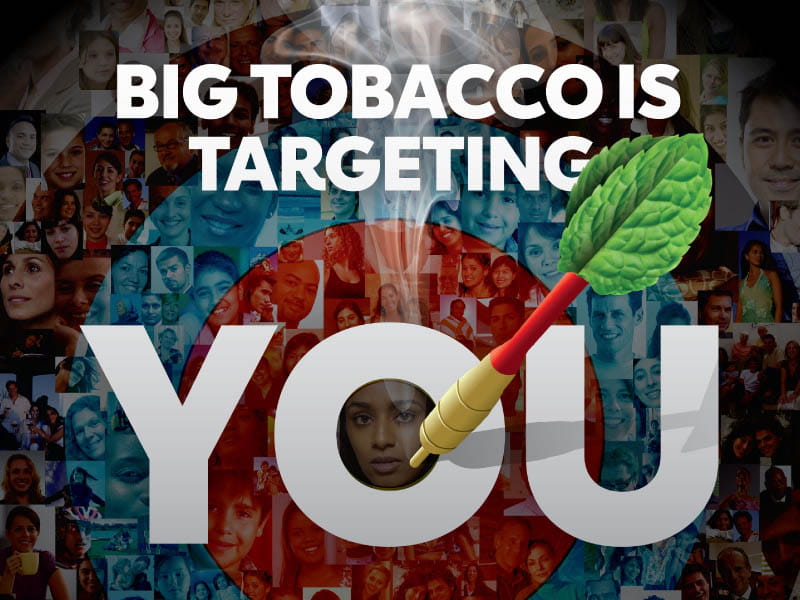Tobacco industry pinpointed targets for menthol messaging, report says

"The fact that Blacks, young people and women, who have in common the fact that they are light smokers, all tend to like menthols, reinforces the concept that menthol provides an 'extra something.'"
— 1979 study for tobacco company
For more than eight decades, tobacco companies have persistently targeted Black communities, women and youth in promoting menthol-flavored products, according to a new report.
The report, from Stanford Research into the Impact of Tobacco Advertising (SRITA) and the American Heart Association, describes deceptive marketing campaigns that have led to elevated rates of menthol product use, as well as to addiction and premature death, among those groups.
More than 8 in 10 Black people and 4 in 10 women who smoke use menthol cigarettes, and over half of teens who start smoking begin with a menthol brand.
"Nearly a century of disgraceful behavior by the tobacco companies has made clear that menthol and other flavored tobacco products threaten public health and perpetuate inequities. They should no longer be sold," said Dr. Rose Marie Robertson, AHA deputy chief science and medical officer and co-director of the AHA Tobacco Center for Regulatory Science.
Menthol's cool flavor makes it easier for smokers to inhale deeply, research has shown, leading to a higher nicotine dose and potentially stronger addiction than experienced by those who smoke non-menthol cigarettes.
As early as the 1930s, cigarette companies conducted an intense, sustained effort to market menthol, targeting consumers by skin color, gender and age, industry documents and advertising show. Active promotion of menthol products continues today with new products and marketing campaigns, according to the report, released in October.
Menthol's many forms
Despite ongoing efforts to restrict availability of menthol-flavored tobacco products, they remain popular. While some brands are well-known for menthol, nearly all cigarette brands have menthol product lines and some offer multiple menthol variants.
The report also found that tobacco companies have reinvented their products in multiple ways that evade restrictions on menthol tobacco sales. One tactic is developing products such as capsule cigarettes, which use unflavored tobacco but produce a burst of menthol on demand when the filter is squeezed. Tobacco companies also skirt regulations by selling menthol or mint varieties of other products subject to different regulations, such as e-cigarettes.
Another new industry marketing tactic is the depiction of menthol products as "organic," "additive-free" or "plant-based." The report says this "greenwashing" of menthol cigarettes continues years of tobacco industry efforts to hide the health hazards of tobacco use.
"By continuously rolling out new marketing campaigns and innovating their products to avoid oversight, the tobacco industry is intent on recruiting new tobacco users and continuing to threaten public health," said SRITA founder and principal investigator Dr. Robert K. Jackler of Stanford University School of Medicine.
Targeting Black communities
"The Black segment has been identified as the Brand's Special Market priority."
— 1981 corporate document for menthol cigarette brand
The new report details Big Tobacco's strategy, starting in the 1960s, of flooding urban, predominantly Black communities with menthol cigarette ads on billboards, buses and subways. Marketing also included coupons, samples and "starter packs," and featured Black athletes and entertainers touting menthol products in prominent Black publications.
"Exposing the ways tobacco companies target people in disadvantaged communities with products that threaten their health is core to the American Heart Association's commitment to battling systemic racism," said AHA President Dr. Michelle A. Albert, a professor of medicine at the University of California, San Francisco who is also immediate past president of the Association of Black Cardiologists.
"To promote public health and achieve health equity, we must enact proven public policies that prevent the industry from engaging in practices that have contributed to the loss of millions of lives from tobacco use," she said.
Appealing to women
"Lady, Be Cool"
"For More of a Woman"
— cigarette ads slogans in women's magazines
Recognizing that women were early adopters of menthol brands, the tobacco industry devised campaigns, brands and packaging with a glamorous, feminine flair. Some ads included well-known fashion designers, and one campaign featured Black supermodel Iman.
Aiming at the youth market
"(One brand's) franchise represents the youngest demographic profile in the industry. This profile is enviable in terms of it being an 'in' brand, as well as insuring future viability as long as these smokers stay within the … franchise." —1984 cigarette brand promotion plan
Big Tobacco has focused on recruiting and supporting young smokers for nearly a century, with at least one leading menthol brand in the 1990s targeting "primarily to young ethnic adult smokers ages 18-24," the report shows. The company viewed that market as "a major source of new business."
The quest for health equity
The new report is a key driver of the AHA's efforts to remove barriers to health care access and quality. Those efforts include calling out industry targeting of under-resourced communities with unhealthy products.
The report also adds momentum to the AHA's advocacy in support of public policies that will help end tobacco use and nicotine addiction. The AHA and its grassroots advocates nationwide are urging the Food and Drug Administration to prohibit menthol cigarettes and flavored cigars, and are working at the federal, state and community levels to end the sale of all flavored tobacco products.
Download (PDF) the full report, "Advertising Created and Continues to Drive the Menthol Tobacco Market: Methods Used by the Industry to Target Youth, Women and Black Americans," or the executive summary or fact sheet.





